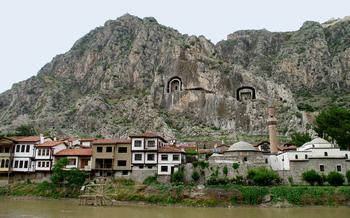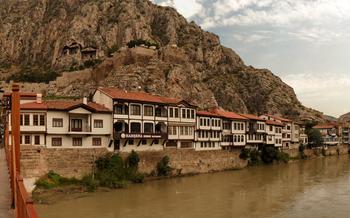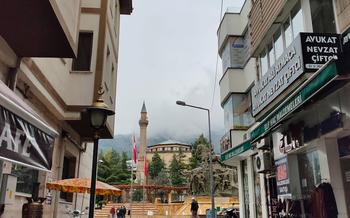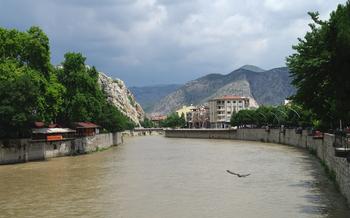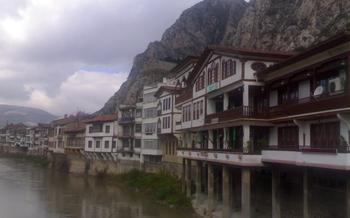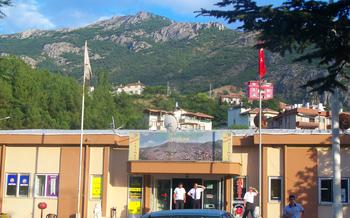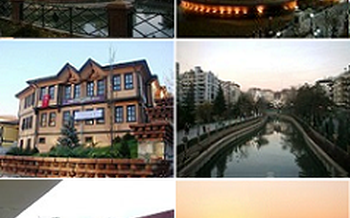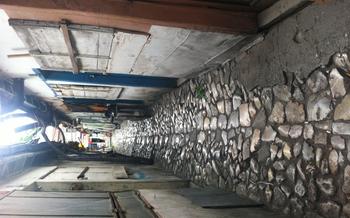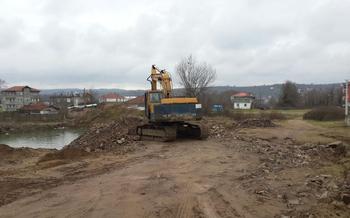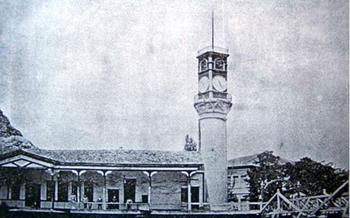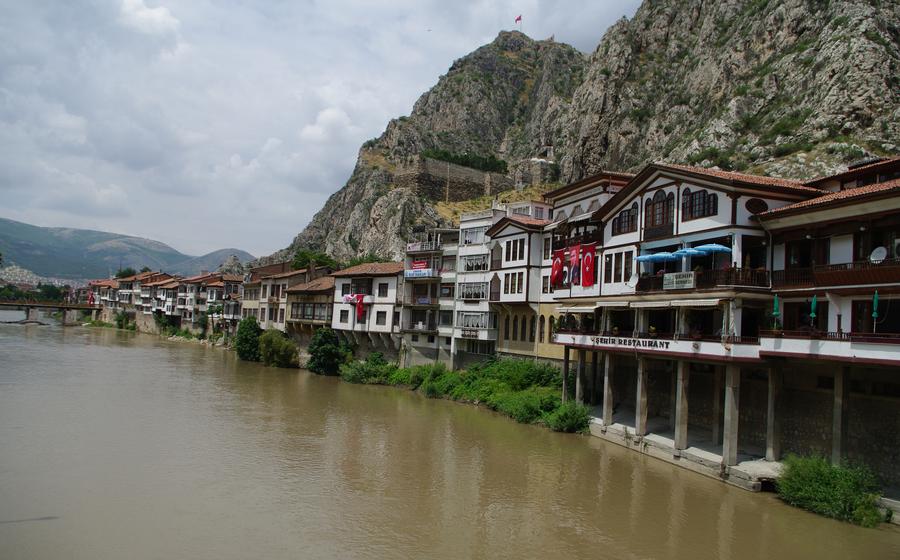
Bayezid II Mosque and Theological School
- Bayezid II Mosque and Theological School: A Majestic Legacy
- Location and Accessibility
- Dress Code and Etiquette
- Exploring the Mosque's Interior
- Theological School and Its Legacy
- Historical Significance and Ottoman Architecture
- Cultural Events and Festivals
- Local Cuisine and Culinary Delights
- Nearby Attractions and Points of Interest
- Shopping and Handicrafts
- Accommodation Options
- Language and Communication
- Safety and Security
- Insider Tip: Unveiling Amasya's Hidden Gems and Local Insights
Bayezid II Mosque and Theological School: A Majestic Legacy
In the heart of Amasya, a city steeped in history and natural beauty, stands the magnificent Bayezid II Mosque and Theological School, a testament to Ottoman grandeur and architectural ingenuity. Built in the late 15th century by Sultan Bayezid II, this iconic complex has played a pivotal role in shaping Amasya's cultural and religious identity.
Historical Background: The Bayezid II Mosque and Theological School was constructed during a period of significant expansion and consolidation for the Ottoman Empire. Sultan Bayezid II, a prominent ruler known for his patronage of the arts and sciences, commissioned the complex as a symbol of his power and piety. The mosque served as the main place of worship for the city's growing Muslim population, while the theological school attracted students from across the empire, establishing Amasya as a center of Islamic learning and scholarship.
Architectural Marvel: The Bayezid II Mosque and Theological School stands as a masterpiece of Ottoman architecture, showcasing a harmonious blend of traditional and innovative design elements. Its most striking feature is the grand main prayer hall, adorned with intricate tilework, elegant calligraphy, and a magnificent mihrab. The courtyard, with its ablution fountain and surrounding arcades, provides a serene space for contemplation and reflection. The complex also boasts four graceful minarets, symbolizing the mosque's importance as a religious and cultural landmark.
Cultural Significance: The Bayezid II Mosque and Theological School holds immense cultural significance for the people of Amasya. As the city's primary mosque, it has been a focal point of religious life for centuries, hosting daily prayers, special ceremonies, and festivals. The theological school, once a renowned center of Islamic scholarship, continues to play a vital role in preserving and transmitting Islamic knowledge and traditions. The complex represents the deep-rooted faith and cultural heritage of Amasya and remains a symbol of the city's rich history and identity.
Symbol of Resilience: The Bayezid II Mosque and Theological School has endured numerous challenges and renovations throughout its long history. It has withstood earthquakes, fires, and the passage of time, testament to its exceptional construction. In recent years, extensive restoration efforts have been undertaken to preserve the complex's architectural integrity and ensure its continued legacy. The mosque and theological school stand as symbols of resilience, embodying the enduring spirit of Amasya and its people amidst the trials of history.
Location and Accessibility
The Bayezid II Mosque and Theological School enjoys a prime location in the heart of Amasya, making it easily accessible for visitors. Situated within walking distance of other major attractions, the mosque is a central hub for exploring the city's rich history and cultural heritage.
To reach the mosque, visitors can opt for various transportation options. Public buses provide convenient and affordable access, with several routes passing near the mosque. Guided tours are also available, offering a hassle-free way to explore the mosque and other landmarks in Amasya.
For those arriving by car, ample parking facilities are available in the vicinity of the mosque. Designated parking areas ensure that visitors can conveniently park their vehicles and focus on their exploration of this architectural masterpiece.
The mosque is committed to inclusivity and accessibility for visitors with disabilities. Wheelchair ramps and accessible entrances allow for easy navigation throughout the complex, ensuring that everyone can enjoy the beauty and tranquility of this sacred space.
Dress Code and Etiquette
When visiting the Bayezid II Mosque, it is essential to observe the appropriate dress code and etiquette as a sign of respect for the religious significance of the site. For both men and women, modest attire is recommended. Men should wear long pants, while women should cover their shoulders and heads with a scarf or shawl. These items can be rented or purchased at the mosque if needed. Additionally, visitors are requested to maintain a respectful demeanor, avoid loud conversations or disruptive behavior, and refrain from taking photographs or using flash during prayers. Shoes should be removed and stored in the designated racks before entering the prayer hall. By adhering to these guidelines, visitors can ensure a peaceful and respectful environment for all.
Exploring the Mosque's Interior
Marvel at the architectural wonders within the Bayezid II Mosque. The main prayer hall is a testament to grandeur, adorned with intricate decorations and a unique mihrab that commands attention. The serene courtyard invites tranquility, with its ablution fountain and surrounding arcades providing a peaceful respite. Ascend the mosque's four minarets, each exhibiting distinctive architectural features that showcase the pinnacle of Islamic artistry. Discover the tombs located within the complex, including the final resting place of Bayezid II, adding a layer of historical significance to your visit.
Theological School and Its Legacy
The Bayezid II Theological School was an integral part of the mosque complex and played a crucial role in shaping the intellectual and religious landscape of Amasya. This prestigious institution served as a center of Islamic learning and scholarship, attracting renowned scholars and students from across the region. Among its notable faculty members were scholars like Molla Lütfi, who made significant contributions to Islamic jurisprudence and theology.
The school offered a comprehensive curriculum that encompassed a wide range of subjects, including Quranic studies, Hadith, Islamic law, and philosophy. Students who graduated from the theological school went on to become influential figures in religious, intellectual, and political life, contributing to the spread of knowledge and the preservation of Islamic traditions.
The legacy of the theological school can still be felt in Amasya today. The city remains a center of Islamic scholarship and is home to several other religious institutions and educational centers. Visitors to the mosque can explore the former classrooms and libraries of the theological school, which provide a glimpse into the rich intellectual history of this remarkable complex.
Historical Significance and Ottoman Architecture
The Bayezid II Mosque stands as a testament to the grandeur and power of the Ottoman Empire. Constructed during a period of significant expansion and consolidation, the mosque reflects the architectural innovations and artistic achievements of the Ottoman era. Its unique dome, intricate tilework, and harmonious proportions showcase the blending of traditional Islamic design with Ottoman architectural style.
Designated as a UNESCO World Heritage Site, the mosque's historical and cultural significance is recognized globally. This prestigious recognition underscores the mosque's exceptional value and the importance of preserving its architectural heritage for future generations.
Cultural Events and Festivals
The Bayezid II Mosque and Theological School are not just architectural marvels but also vibrant centers of cultural activities and religious celebrations. One of the most significant events held at the mosque is the annual Mevlid celebrations, which commemorate the birth of Prophet Muhammad. During this time, the mosque comes alive with colorful decorations, recitations of prayers and hymns, and a festive atmosphere that attracts visitors from far and wide.
In addition to the Mevlid, the mosque also hosts various religious ceremonies and events throughout the year, including Quran recitals, Islamic lectures, and Sufi gatherings. These events provide an opportunity for visitors to immerse themselves in the spiritual and cultural traditions of the region.
Amasya, as a city, is known for its rich cultural heritage and vibrant festivals. Visitors can explore local festivals that showcase the city's unique traditions, music, and dance. For those visiting during the month of Ramadan, the city transforms into a hub of festivities, with special prayers, communal meals, and celebrations marking the end of the holy month with Eid al-Fitr.
Local Cuisine and Culinary Delights
Amasya's culinary scene offers a tantalizing blend of traditional Turkish dishes and local delicacies. Savor the flavors of Amasya kebabı, a succulent skewer of grilled lamb served with tomato sauce and yogurt. Indulge in çılbır, a unique dish of poached eggs served on a bed of creamy yogurt and topped with butter and paprika. Experience the hearty goodness of keşkek, a traditional Anatolian dish made from pounded wheat, meat, and spices.
Explore the vibrant street food scene and sample local delicacies like simit, a circular bread encrusted with sesame seeds, and gözleme, a savory pastry filled with various ingredients such as cheese, spinach, or minced meat. Treat your sweet tooth with Turkish delight, a confection made from sugar, starch, and flavored with rosewater or other essences.
For a memorable dining experience, head to one of the reputable restaurants or cafes near the mosque. Savor the authentic flavors of Turkish cuisine while enjoying the warm hospitality of the locals. Consider taking a culinary workshop or cooking class to learn how to prepare these delicious dishes yourself.
Nearby Attractions and Points of Interest
Amasya is a treasure trove of historical and natural wonders waiting to be explored. Just a stone's throw from the Bayezid II Mosque, you can delve into the city's rich past by visiting the awe-inspiring Amasya Castle. Perched atop a hill, this formidable fortress offers panoramic vistas of the city and the meandering Yeşilırmak River.
Venture further to discover the ancient rock tombs carved into the cliffs near the river. These enigmatic remnants of Amasya's past provide a glimpse into the lives of its earliest inhabitants.
To delve deeper into the city's cultural heritage, visit the local museums and galleries. The Amasya Museum houses a fascinating collection of artifacts that narrate the city's journey through the ages.
If nature beckons, embrace the picturesque surroundings of Amasya. Stroll along the lush green valleys, immerse yourself in the tranquility of the riverbanks, or embark on a rejuvenating hike through the scenic trails.
Shopping and Handicrafts
Explore the vibrant handicraft scene in Amasya and discover unique souvenirs and handmade items that reflect the region's rich cultural heritage. Visit traditional markets or bazaars to experience the local atmosphere and find authentic Turkish souvenirs, including handwoven carpets, intricate silver jewelry, and colorful ceramics. Learn about the region's carpet weaving tradition and see skilled artisans at work, creating beautiful carpets with intricate designs and vibrant colors. Explore the local silver jewelry shops and find exquisite pieces handmade by local craftsmen, showcasing traditional motifs and delicate filigree work. Amasya's handicrafts offer a tangible connection to the city's history and culture, making them cherished keepsakes for visitors.
Accommodation Options
Amasya offers a diverse range of accommodation options to suit every traveler's needs and budget. From cozy guesthouses and budget hotels to luxurious resorts with modern amenities, there's something for everyone.
When selecting your accommodation, consider its location in relation to the Bayezid II Mosque and other attractions you plan to visit. Many hotels are situated within walking distance of the mosque, allowing you to explore the city's historic center conveniently.
Research the amenities and facilities offered by different hotels to ensure they align with your preferences. Some hotels provide breakfast, Wi-Fi, and tour arrangements, while others may have swimming pools, fitness centers, or spas.
Booking your accommodation in advance is advisable, especially during peak tourist season. This will guarantee your preferred room type and avoid any last-minute surprises. Online booking platforms and travel agents can assist you in finding the best deals and discounts.
Whether you seek budget-friendly options or a luxurious stay, Amasya's accommodation scene offers something for every traveler. Choose the one that suits your needs and preferences to make your visit to this historic city truly memorable.
Language and Communication
Turkish is the official language of Turkey, and while English is understood and spoken to some extent in tourist areas, it's helpful to learn a few basic Turkish phrases to communicate with locals and navigate the city more easily. The Turkish language is rich in body language and gestures, so pay attention to these non-verbal cues when interacting with locals. Translation apps and services can be useful in overcoming language barriers, especially when visiting smaller establishments or interacting with people who may not speak English.
Safety and Security
Amasya is generally considered a safe city for tourists. However, as with any destination, it's essential to be aware of your surroundings and take necessary precautions. Avoid walking alone at night, especially in isolated areas. Be respectful of local customs and traditions, and dress modestly to avoid attracting unwanted attention. If you're a solo traveler, consider joining a tour group or hiring a guide to ensure your safety. Keep important emergency contact numbers handy, including the local police and medical services. Trust your instincts, and if a situation feels unsafe, remove yourself from it immediately. Remember, safety is your responsibility, so stay vigilant and take sensible precautions to ensure a trouble-free trip.
Insider Tip: Unveiling Amasya's Hidden Gems and Local Insights
Amasya is a treasure trove of hidden gems waiting to be discovered by curious travelers. Venture beyond the main tourist attractions and explore the lesser-known corners of the city to uncover its true charm. Ask locals for their recommendations on places to visit, eat, or shop, as they can provide valuable insights into the city's hidden gems.
One such hidden gem is the Bezirganbaşı Konağı, a beautifully preserved Ottoman mansion that offers a glimpse into the city's past. Admire its intricate architecture, wander through its lush gardens, and enjoy a traditional Turkish coffee in its charming café.
For a unique culinary experience, head to the local market and sample the delicious street food offerings. Indulge in freshly baked simit, gözleme filled with savory fillings, and melt-in-your-mouth Turkish delight. Don't forget to try the famous Amasya kebabı, a succulent grilled meat dish that is a local specialty.
If you prefer a more relaxed pace, consider visiting Amasya during the shoulder season (spring or autumn). The weather is still pleasant, but the crowds are smaller, allowing you to enjoy a more intimate and authentic experience.
Finally, don't forget to capture the beauty of Amasya through photography. The city's stunning views, historical landmarks, and vibrant street life provide endless opportunities for memorable photographs. So bring your camera and capture the essence of this enchanting Turkish city.
